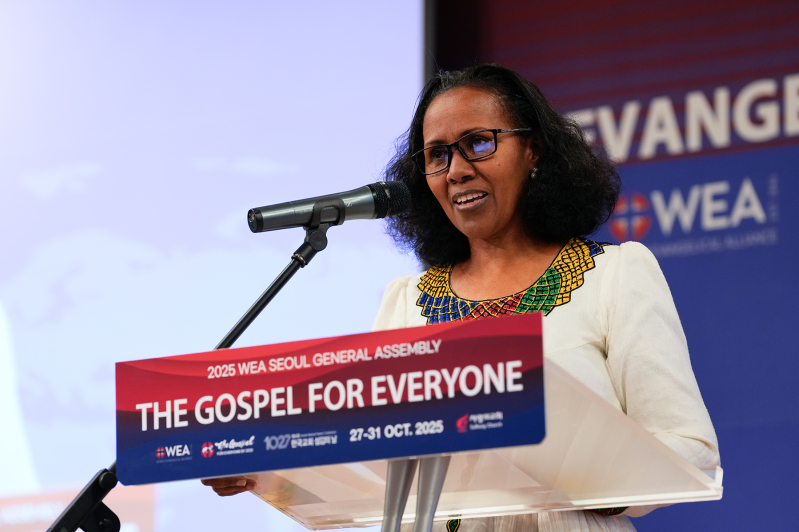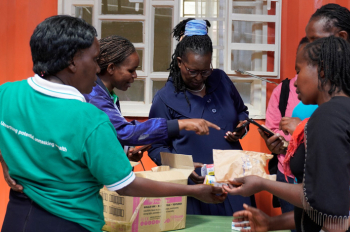
Dr. Seble Daniel, director of the World Evangelical Alliance (WEA) Women’s Commission, delivered the opening devotional at the WEA General Assembly in Seoul on Oct. 27, urging delegates to remember their identity in Christ and to live as one reconciled family.
The gathering, held from Oct. 26 to 31 under the theme “The Gospel for Everyone,” brought together hundreds of evangelical leaders from across the world to pray, reflect, and strategize for mission and unity.
Drawing from Ephesians 2:13-18, Daniel spoke about the transformation that takes place when people who were once far from God are brought near through the cross of Christ. “We who were once far off have been brought near,” she said, emphasizing that reconciliation with God must also lead to reconciliation among people divided by class, gender, ethnicity, and status. “There is no us and them,” she added. “There is one family.”
To illustrate how easily people rebuild barriers Christ has already torn down, Daniel recounted a personal experience at an airport. Standing in a long immigration line filled mostly with young women traveling to the Middle East for domestic work, she admitted she initially felt embarrassed to be mistaken for one of them. Her instinct, she said, was to distinguish herself by her education and international travel. But that moment, she realized, exposed the same pride that often divides the church. “Inside my heart, I thought, that’s how you should treat me — I’m different,” she confessed. “Isn’t this a struggle in all of us? Don’t we crave recognition and want to feel better than others?”
Daniel linked this attitude to the divisions within the ancient city of Ephesus, which she described as “wealthy, diverse, religious, full of culture and trade, yet beneath the surface deeply fragmented.” Just as the apostle Paul wrote to the Ephesians about unity in Christ, she said, the modern church must rediscover the same message: that Christ “has made the two groups one and has destroyed the barrier, the dividing wall of hostility.”
She urged the assembly to remember who they were before Christ, to reflect on what God has done through salvation, and to realign their relationships according to their new identity. Remembering one’s former alienation, Daniel said, cultivates humility and gratitude. Remembering God’s saving grace fosters reconciliation, because “He brought you near when you were far, He welcomed you when you were unworthy, He made peace when you were His enemy.”
Daniel warned that although the wall of hostility has been torn down by Christ, believers often rebuild it through tribalism, racism, pride, and exclusion. She cited an example from her own community in Ethiopia, where social hierarchies persist even among devoted Christians. “In the community I grew up in, potters and ironsmiths were looked down on,” she said. “Even a vibrant evangelical church that had endured persecution struggled with exclusion.”
The Ethiopian theologian challenged listeners not to judge others harshly for such failures but to examine their own hearts. “Don’t we still draw invisible lines? Don’t we talk about ‘us’ and ‘them’?” she asked. “Sadly, the church is meant to be a place of refuge, but sometimes it becomes a place of exclusion.”
Speaking from her experience leading the WEA Women’s Commission, Daniel acknowledged that many women have felt rejected or overlooked in the church. “For many women, it feels less welcoming than the world outside,” she said, lamenting how some have been wounded by leaders who should have protected them. “When we close our hearts or doors, we deny our new identity in Christ. The church binds those whom Christ came to set free.”
She urged believers who hold power or privilege to use it to lift others up, affirming those who have been marginalized and giving space for overlooked voices to serve. “If God has given you strength or privilege, use it to open doors for others,” she said. “Serve the least, because God has made us one family. He has torn down the wall; we must not rebuild it.”
“The gospel must not only be preached,” Daniel concluded. “It must be seen — in how we treat one another, how we serve, forgive, and love. Living the gospel means remembering your story — who you were, who you are now — and realigning your relationships to reflect the peace Christ has made.”
Click here for CDI's full reporting from the WEA General Assembly.






